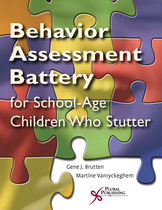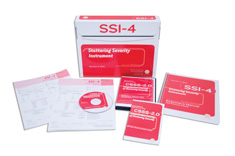|
Here's a topic that I haven't blogged about before--stuttering. If you're a speech language pathologist, how often have you attended stuttering workshops? I can honestly say that I hadn't been to any stuttering conferences since I've been a speech language pathologist (nearly 15 years) until I attended the Northwest Ohio Speech Language Hearing Association's Fall Conference this past November. I then had the privilege of attending a local Friends Who Stutter One-Day Conference this past weekend to further my knowledge. With that said, I thought I would give you a glimpse of what I learned from Dr. Rodney Gabel of The Northwest Ohio Stuttering Clinic at The University of Toledo and Dr. Charles Hughes from Bowling Green State University. For the sake of this blog post, I'll reiterate the stuttering assessment process. Stay tuned for a post on stuttering treatment.
Assessment of Stuttering
Before assessing stuttering, you must understand that it is a multidimensional problem. It's not just the stuttering. You also need to look at the person (and his/her environment) as a whole. Assessment should look at basic behaviors noted in speech, behavioral and cognitive reactions to stuttering, and the impact of stuttering in the child's life. The information can then be used to develop a treatment plan. Dr. Gabel noted that (school-age) children must want to make a change and become dedicated to making a change.
When completing a stuttering assessment, it is imperative to establish a rapport. Much of the information collected will be qualitative to help understand the impact of the client's feelings, thoughts, and speech. You can attain this information using one of the attitudinal measures listed below. Use open ended interview questions such as "Tell me about your speech." and fill in the blank statements such as "My views on school..." Stuttering moments might not always occur during the assessment, so it's a good idea to have the client/family tape stuttering outside of clinical setting (maybe with a cell phone) if possible. It's also a good moment to begin some trial therapy to learn what works best for the child. Explore stimulability. Have the child identify some of your stutters for practice. See if they can identify stuttering moments by tallying your stutters. This might be a good moment to also teach some strategies such as slow rate, easy phonation, and holding on/freezing moments of stuttering. Assessment Tools The OASES is an assessment that looks at how stuttering affects the person who stutters. It measures the impact of stuttering in multiple life situations. The information can be used throughout the treatment to provide general information about the child's stuttering, reactions (feelings, thoughts, actions) to stuttering, functional communication difficulties (at home, school, other environments), and the impact on the quality of life. The OASES is an assessment that looks at how stuttering affects the person who stutters. It measures the impact of stuttering in multiple life situations. The information can be used throughout the treatment to provide general information about the child's stuttering, reactions (feelings, thoughts, actions) to stuttering, functional communication difficulties (at home, school, other environments), and the impact on the quality of life.The Behavioral Assessment Battery is used provides a picture through the eyes of a child whose fluency is problematic. The results help drive the treatment plan and helps shape the child's speech strengths and weaknesses along with his or her needs. This A-19 Scale is used to assess the attitudes of kindergarten through fourth grade students. The assessment was created by Susan Andre and Barry Guitar at the University of Vermont.
The SSI-4 is a normed referenced assessment that helps identify stuttering severity in children and adults. It measures frequency, duration, physical concomitants, and the naturalness of the individual's speech.
Goals for Stuttering
Once the assessment is complete, it is time to set goals for the student. The goals and outcome of treatment vary upon age groups.
Overall, when assessing stuttering, you need look at what the child does want to change, how the child approaches his/her stuttering, and how the child deals with his/her stuttering. That should always guide the direction of therapy. If you live near Northwest Ohio and would like a stuttering assessment, please visit www.rkspeech.com for more information.
For more information on stuttering, visit the following:
1 Comment
|
AuthorRyan is the owner of RK Speech and Technology LLC in Perrysburg, Ohio. He is licensed in Ohio and Michigan. Ryan has been an active member of the American Speech Language Hearing Association (ASHA) since 2003. Archives
March 2021
Categories |
Location |
|


 RSS Feed
RSS Feed
